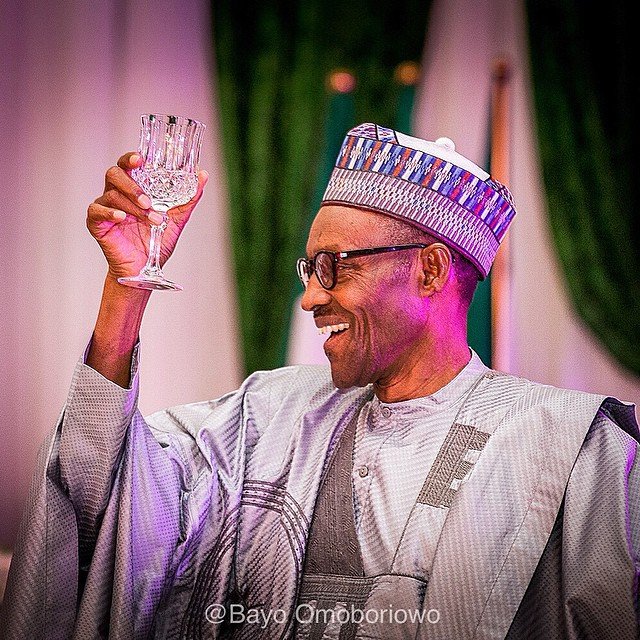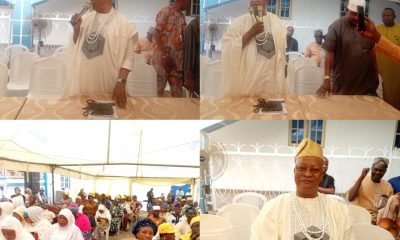News
Buhari @78: President Or Mannequin?

Today, December 17, President Muhammadu Buhari turns 78. His storied life has not been short of ironies.
The biggest of this ironies, it would seem, is how strange and mystifying it is that a man who fought stubbornly for 12 full years for the honour to govern a country would suddenly lose all interest in governance once he got the chance to rule.
The warning signs were there from the moment he won that election in March 2015 that his impetus to govern had suffered a catastrophic failure and become flaccid like the weary arm of a stuffed doll.
Taking eight months, from winning the elections, to announce a cabinet was a starting point of this unravelling. Pointedly refusing to raise a finger against those responsible for padding the budget in that first year, despite promising to fight corruption, was yet another. But Nigerians, weary of the wastefulness of the Jonathan years, were far more accommodating of Buhari’s excesses than they had ever been with any president in the history of the country.
Those who expected Buhari to hit the ground running, after assuring that he, like Trump, knows better than anyone else, what the trouble with Nigeria is, amplified the excuses his spokesmen reeled out. Instead of setting out policies and directives, what emanated from the villa were constant buck shifting to people who were no longer in government, who had, in fact, been removed so Buhari could get the job done.
To think of it, the one thing Buhari did as president with any degree of conviction was the pursuit of a vindictive persecution of former National Security Adviser, Sambo Dasuki, who in 1985, when General Buhari was toppled in a coup, led soldiers to arrest the former head of state.
Like a mean cat, he toyed with Dasuki before throwing him in jail and obstinately ignored court orders to free him. Once that plaything was out of his hands, it seemed the president decided to kick off his shoes, put his feet up, pick his teeth and live out his remaining years in Aso Rock as if in a hospice. It is no coincidence that the image that comes to mind when Buhari is mentioned is that of him sitting on a single sofa, barefoot, in his grey ‘yar ciki, gingerly picking his teeth, watching himself on TV, successfully transforming himself from president to mannequin, on whose behalf laconic press statements of condemnations are issued for killings he had promised to end.
Otherwise, how does one explain that two weeks after the Zabarmari massacre, Buhari has refused to address the killings, preferring his foot soldiers pontificate over the right of the National Assembly to invite him to address the mass murder of his citizens before he himself escaped on a private jaunt to his Daura country home?
Two weeks after, there has been no response whatsoever by the military with Buhari as C-in-C to the massacre. No retaliatory strike, no punitive expedition on Boko Haram, not even a convincing pretence of outrage.
It is even more puzzling that less than 200 kilometres from his Daura home, hundreds of students were abducted under his watch and Buhari remains in his home, legs crossed, picking his teeth, leaving poor Governor Masari to be running between Safa and Marwa to brief him. There could only be two explanations for this. Either Buhari lacks compassion whatsoever for his populace who voted for him in droves and stood by him even when it was painfully clear he had very little to offer as president, or that Buhari has become that mannequin shuffled about by shop attendants who position it and twist it into various glamorous poses for their merchandise.
In this regard, one must consider the much-maligned First Lady, Aisha Buhari, who had stridently—catcalled, shrieked and all—fought those she believed had taken control of her husband. Many Nigerians made a mockery of the poor woman but upon scrutiny, it would seem Madam First Lady was onto something.
It would be convenient, as this government has perfected the art of doing, to blame everyone else but Buhari—to blame those around him, or the failure of his service chiefs, or his ministers, but the simple truth is that our contract as Nigerian electorate was not with any of these persons but with Buhari himself. He was the one Nigerians voted for. He was the one who promised to secure this country, swore to fight corruption and vowed to improve the economy.
Nigeria is in recession, for the second time under his watch. In his six years, there hasn’t been any cogent strategy to fight corruption; universities have been shut for nearly a year; and the country has never been more insecure than it is now. People are being picked off the streets for ransom, being picked from their homes, from schools and the Boko Haram Buhari promised to defeat in six months, audaciously announced had been “technically defeated” in December 2015, has somehow acquired the capacity to abduct nearly 600 students right under Buhari’s nose.
Through all this, the president seems determined to enjoy his holiday and not even the impudence of Boko Haram in his backyard would move him.
Those who are too young to understand why in 1985 many Nigerians travelled, or were sponsored, to the holy land to pray for Buhari’s ouster as head of state might now have more sympathy for those who did that then. The biggest tragedy here is that, with the benefit of hindsight and experience, Buhari had the chance to redeem himself from that 1980s fiasco.
By all indicators of good governance—voice and accountability, political stability and lack of violence, government effectiveness, regulatory quality, rule of law and control of corruption—it is clear that Buhari’s government has failed, and even in recent weeks, his staunchest supporters have struggled to explain his ineffectiveness. This is where one feels sorry for people like Garba Shehu, for whom it must be a nightmare trying to work in this government. Not to talk of those, like Sheikh Sani Yahya Jingre, who for baffling reasons, have chosen now to tell us how wonderful Buhari has been as president when everything, every single rational fact, points to the opposite.
Six years is a long time for one to keep failing at the one thing he had aspired to for 12 years. After half a dozen years of serial disasters in governance, it is clear this government has no clue how to tackle the challenges facing this country. This nonchalance is causing precious Nigerian lives.
If Buhari was bad at governance in 1985 when he was overthrown and is still bad at it in 2020, it simply means one thing—he is just bad at it.
It, therefore, makes no sense for us to continue this way for another two and a half years. If at all Buhari loves this country, as he reflects on this day of his birthday, he would do what is best for it; what he himself had on several occasions asked his predecessor to do—tender his resignation and leave governance to those with the zeal and interest to lead.
Dr. Fatima Damagum is unavoidably absent this week.
(Daily trust)
-

 Opinion5 days ago
Opinion5 days agoDon’t Pull the Plug: Why Nigerians Are Pleading for the U.S. to Extend Its Police Training Program — and Why It Must Synergize With New Military Arrivals
-

 Crime4 days ago
Crime4 days agoVigilante Reportedly Shoots Colleague Dead In Plateau
-

 News3 days ago
News3 days agoRamadan: Osun Cleric Urges Compassion Among Muslims As Asejere Distributes Relief Materials To 537 Beneficiaries
-

 Crime5 days ago
Crime5 days agoMan Shot Dead In Ambush Along Jol-Sho Road In Plateau

